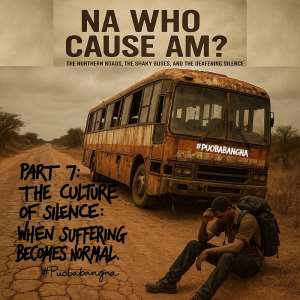
One of the most haunting realizations during my journey wasn’t just the broken road or the rickety bus—
It was the silence.
The painful, collective silence of passengers who had come to accept suffering as normal.
No one shouted.
No one protested.
No one asked questions.
We just endured.
Each bounce met with a sigh.
Each breakdown shrugged off like it was part of the itinerary.
And maybe that is the scariest part—
We have normalized dysfunction.
This silence isn’t unique to that bus.
It echoes across Ghana.
It is the same silence in communities where clean water is a fantasy.
In schools where children learn under trees.
In hospitals where prescriptions are written but the drugs don’t exist.
In homes where electricity is more of a lottery than a service.
It’s the silence of resignation—
The dangerous culture that whispers,
“This is how it’s always been. Maybe this is how it will always be.”
But what kind of nation are we becoming
If pain becomes our default
And complaining becomes taboo?
If no one gets angry anymore,
If no one raises their voice,
Then those in charge will assume everything is fine.
And the worst part?
They might be right.
Because silence is not the absence of noise.
It is a presence—loud and clear.
It says we are tired.
It says we are hopeless.
It says we are scared.
Tired of speaking with no results.
Hopeless that anything will ever change.
Scared of being singled out for speaking out.
But here’s the truth:
Silence is not neutral.
It is complicity.
Every time we whisper our frustrations instead of shouting them,
We create more space for neglect to thrive.
Every time we joke about how bad things are instead of taking action,
We delay the change we cry for in private.
I realized something on that bus—
I wasn’t just a victim of a broken system.
I was a participant.
A contributor.
An enabler.
Because I kept quiet too.
Until now.
So again, I ask:
Na who cause am?
Is it the leaders who fail to deliver on their promises?
Or is it us—the people—
Who fail to demand more,
Who fail to rise in unity and say, “Enough is enough”?
Up Next – Part Eight: “The Way Forward: From Complaints to Collective Action.”
#Puobabangna
(The Northern Roads, the Shaky Buses, and the Deafening Silence)
By Victor Raul Puobabangna from Eggu, in the Upper West Region of Ghana


